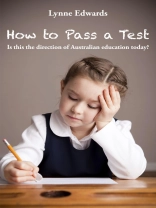‘The measure of how well a school suits your child, and consequently how successful it is in educating your child, does not come from looking up an unreliable and highly variable ranking on the internet. It comes from observing your child, being engaged in the school environment and building up a good relationship with your child’s teachers. In this way, you can work as a team to achieve the very best education for your child, not just in literacy and numeracy but in so many broad-ranging aspects of life. The connection between home and school is fundamental in each gaining an understanding of the goals of the other.’ – Linda Steadman
‘Lynne’s view of education takes readers on a thought-provoking journey of the education system. It’s effectively an appeal to the community to educate itself about the need for a quality education system and to seriously ask ourselves whether a systematic approach to funding linked to performance is the best way to deliver a quality education system.’ – Karen Warner
‘As parents, we compare our understanding of education today to our own experiences going to school in Australia and Japan respectively. However, the world is different today and memories can become imbued with nostalgia. We therefore found that Lynne’s book provided us with a very interesting insight into the education system in Australia today, including some of the real challenges for teachers, drivers for change, government responses and impacts of policy decisions.’ – Christopher and Michiyo Perry
Lynne Edwards is an early childhood-trained teacher who has taught for more than thirty years. She spent the majority of her career in the preschool sector and the last ten years in the junior primary sector. In the early 1990s she was selected to teach one of the first Early Intervention Units in Canberra, working with a team of therapy specialists. She has tutored in the Childcare Course at Canberra’s CIT, and during a sabbatical year in 2003 she was engaged as an early childhood consultant for Questacon, Canberra’s Science Centre. In this role, she conducted research, and advised and assisted the planning team with the design and creation of Mini Q, Questacon’s permanent exhibition for 0–6 year olds. In 1994 Lynne accepted an exchange teaching position in Vancouver Island, Canada. Since retiring in 2008, Lynne has remained involved in the education field. She has continued relief teaching, and was engaged as a University Liaison Officer at the University of Canberra, advising and supporting pre-service teachers in schools.
Om författaren
Lynne Edwards is an early childhood-trained teacher who has taught for more than thirty years. She spent the majority of her career in the preschool sector and the last ten years in the junior primary sector. In the early 1990s she was selected to teach one of the first Early Intervention Units in Canberra, working with a team of therapy specialists. She has tutored in the Childcare Course at Canberra’s CIT, and during a sabbatical year in 2003 she was engaged as an early childhood consultant for Questacon, Canberra’s Science Centre. In this role, she conducted research, and advised and assisted the planning team with the design and creation of Mini Q, Questacon’s permanent exhibition for 0-6 year olds. In 1994 Lynne accepted an exchange teaching position in Vancouver Island, Canada. Since retiring in 2008, Lynne has remained involved in the education field. She has continued relief teaching, and was engaged as a University Liaison Officer at the University of Canberra, advising and supporting pre-service teachers in schools.












